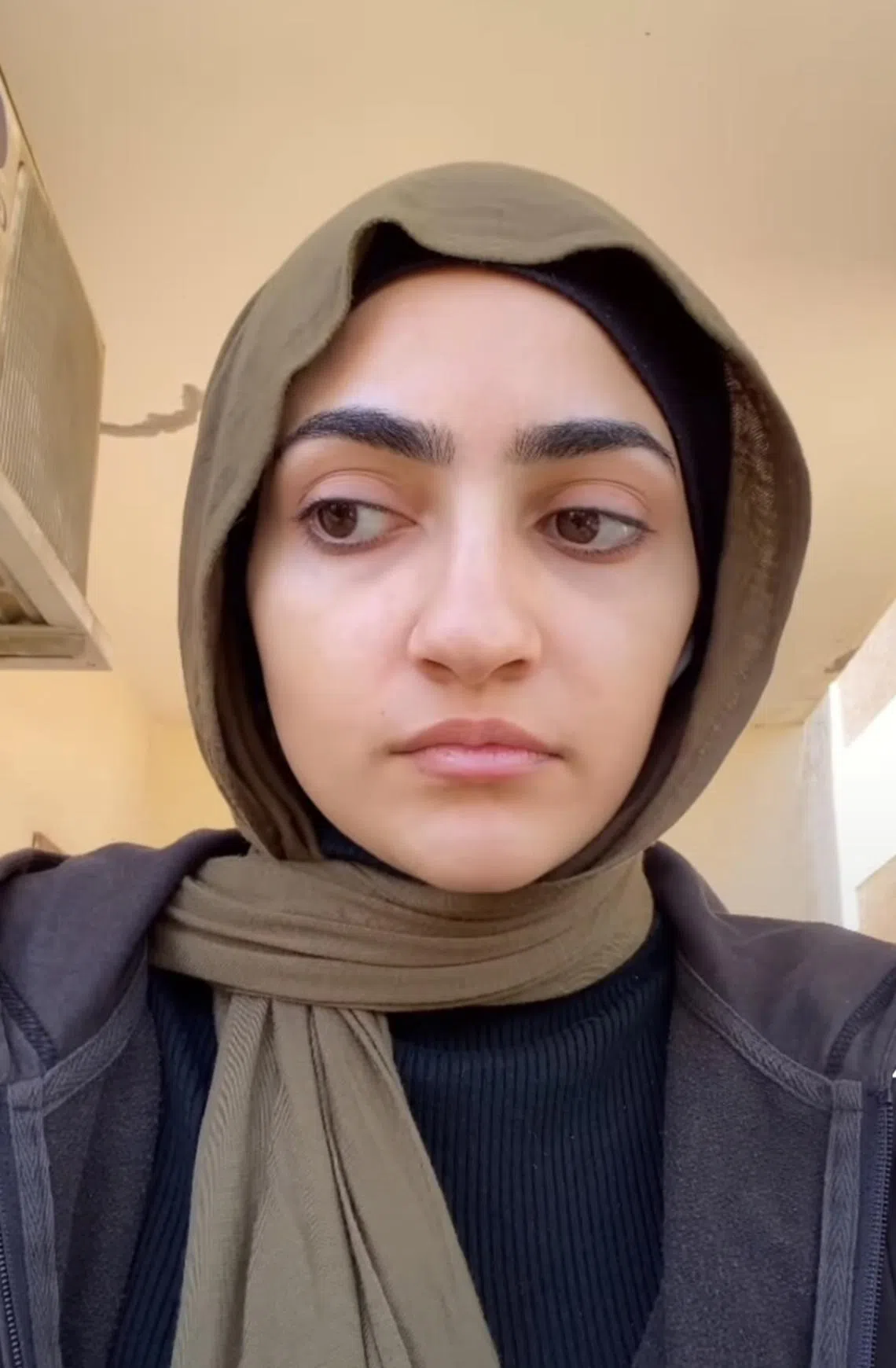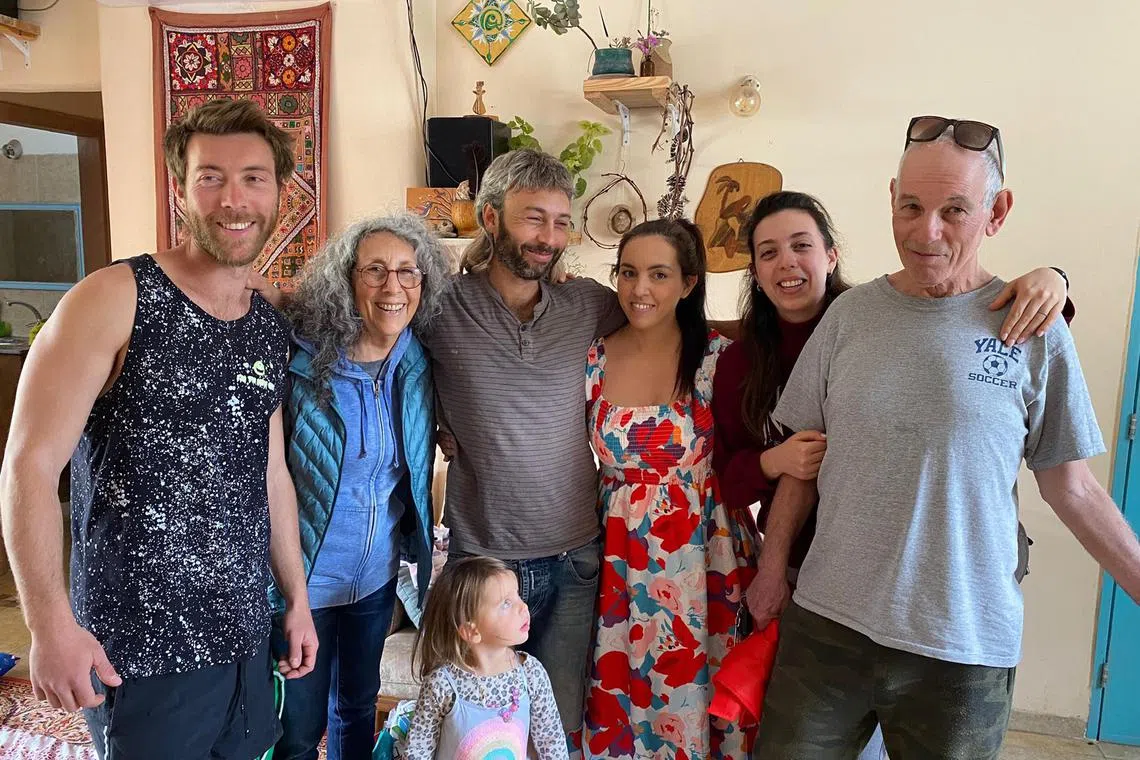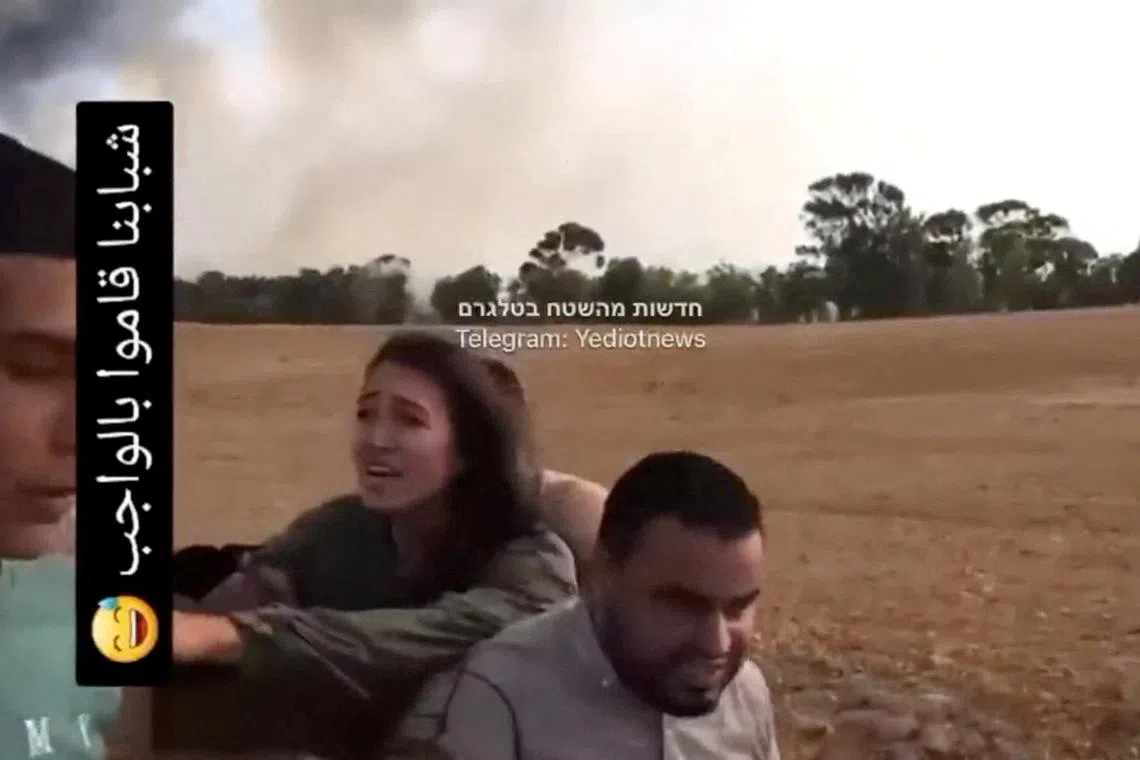Bombs everywhere, parents missing: Stories of fear and loss in escalating Israel-Hamas war
Sign up now: Get ST's newsletters delivered to your inbox
SINGAPORE – In the darkness of early Friday morning, at around 2.30am, the message drifted to the residents of northern Gaza Strip. They have 24 hours to evacuate to the south, said Israel in leaflets dropped by its military aircraft.
Mr Haitham, 50, the owner of a consulting business, did not wait. Immediately, he, his wife and their daughter left their home in Gaza City and drove to Deir al-Balah nearly 15km away, where they have relatives. It is south of Wadi Gaza, the marker identified by Israel that divides the strip.
They just had enough time to take things like important documents, but the drive was smooth as there was little traffic at that hour.
His family may now be in the “safe” half of Gaza, but he is on edge and worries about water running out, he told The Straits Times on Friday night over the phone.
Israel has banned food, fresh water and electricity into the Gaza Strip, and the United Nations has warned that crucial supplies are running dangerously low.
“We’re all worried. Water is everything, for drinking and for everything else,” said Mr Haitham, who asked that his full name not be used for safety reasons.
He is among hundreds of thousands of 1.1 million north Gazans who have abandoned their homes in the last two days ahead of a massive ground invasion by Israel. Others have stayed put, not knowing where they could go in the densely populated territory.
Israel has said that it would not let up on its military actions against Gaza until Israeli hostages, numbering about 120, held by Palestinian militant group Hamas are released.
On Oct 7, Hamas fighters rampaged through south Israel, killing and kidnapping civilians, prompting retaliatory air strikes on Gaza.
More than a week into the Israel-Hamas conflict, stories of fear and loss are emerging – with more than 3,500 deaths on both sides so far.
Mr Fadi Abu Shammalah, the executive director of Gaza’s general union of cultural centres, wrote in The New York Times: “Women and children from my extended family were killed in an attack on Tuesday, and my cousin was killed on Wednesday. The smell of explosives permeates the entire strip.”
Some Palestinians are posting on social media about blackouts, levelled homes or having no safe spaces to escape amid the Israeli aerial bombardment.
“They are basically bombing everywhere. It’s literally a humanitarian crisis,” Ms Nour AlSaqqa, who is in her 20s and has been posting about life under siege in Gaza on Instagram, told NYT.

Ms Nour AlSaqqa has been posting videos about the scenes on the ground in Gaza on Instagram.
PHOTO: NOURALSAQA/INSTAGRAM
Ms Plestia Alaqad, who has also been documenting the situation in Gaza on Instagram, told the daily that the past few days are nothing like what she had experienced before.
“I thought we are used to wars, you know. That’s such a horrible sentence to use, but I’m 22 years old, and I witnessed four wars before. But what is happening is like families are being erased, whole neighbourhoods are being erased.”

Ms Plestia Alaqad said that the past few days are nothing like what she had experienced before.
PHOTO: PLESTIAALAQAD/INSTAGRAM
Mr Haitham worries about the impact of the conflict on young Palestinians. His teenage daughter has been left traumatised by the “much higher” level of violence in the current war than in previous conflicts.
About half of Gaza’s 2.3 million population is under 18 years old, he noted, adding that he worries about an ever-escalating spiral of violence. The ongoing onslaught has left the young in living conditions “not near anything normal”, which could result in “more anger” towards the Israelis.
He has three other children: two sons studying in Canada and another son who escaped to Egypt earlier in the week along with Mr Haitham’s father before Gaza’s Rafah crossing into Egypt was shut.
Across the border from Mr Haitham’s house, an Israeli couple in their 70s were taking their usual morning walk on Oct 7 at a field near their home in Kibbutz Nir Oz when Hamas militants swooped in close by.
The elderly couple dived face down into the grass and sent a text message to their family WhatsApp chat group.
It was about 11.50am in Singapore when their daughter Iris Haggai, 38, a textile designer who moved to Singapore three years ago with her husband and children, got the message.
Worried, Ms Haggai called her mother.
“The rockets are really too close to us,” Ms Haggai’s mother said in the call. Her mother seemed unusually afraid in the call. She told her parents to quickly seek shelter in a safe house.
When Ms Haggai did not hear from her parents after 30 minutes, she feared the worst. She frantically reached out to friends and neighbours in Kibbutz Nir Oz. She then heard from a friend that her father had been badly injured.
Nearly an hour after her call with her mother, Ms Haggai heard that the town was overrun by Hamas militants.

Ms Iris Haggai (in red dress) with her siblings, parents and young niece.
PHOTO: IRIS HAGGAI
In an interview with ST, Ms Haggai said, choking up: “I learnt that the last call made from my mother’s phone was to a paramedic. She was asking for assistance because my father was shot by someone on a motorbike. I was told that the paramedic had tried to contact an ambulance to assist my parents, but it was hit by a rocket.”
Ms Haggai was later told by a friend who helped her check that her parents were feared dead.
She is now in limbo, in Singapore. She has decided against flying to Israel as she has three children, aged two, three and seven, to care for.
Other Israelis fear for their kidnapped loved ones.
Ms Noa Argamani was just five days away from her 26th birthday when she was kidnapped by Hamas militants
Her mother, Ms Liora Argamani, 61, who moved to Israel from China in the 1990s, married an Israeli and settled down there and is battling brain cancer, told NYT: “Having my daughter taken away, it adds to the pain.”

Ms Noa Argamani was just five days away from her 26th birthday when she was kidnapped by Hamas militants at a music festival near Re’im in Israel.
PHOTO: REUTERS
As for Ms Haggai, she said if indeed something untoward had happened to her parents, her only consolation would be that they were together. “I am still in disbelief... I am safe here in Singapore, and I feel like my children are lucky to grow up here in Singapore, where it is safe.”


